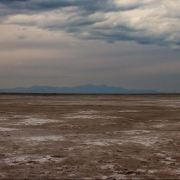Waukesha Awaits Great Lakes Water Diversion Decision
Approval of Wisconsin city’s request for Lake Michigan water is first test of bi-national agreement.

The city of Waukesha, Wisconsin, located just outside of the Great Lakes Basin, is asking to divert Lake Michigan water for its municipal supplies. The governors of eight Great Lakes states will vote on the proposal Tuesday in Chicago, shown here. Photo © J. Carl Ganter / Circle of Blue
By Codi Kozacek
Circle of Blue
The governors of the eight states that share the Great Lakes will decide Tuesday whether Waukesha, Wisconsin should be allowed to divert water from Lake Michigan in the first test of the Great Lakes Compact, a legal agreement between the states, Ontario, and Quebec meant to safeguard Great Lakes water.
Implemented in 2008, the Great Lakes Compact effectively bans communities outside of the Great Lakes Basin from withdrawing Great Lakes water. Communities located in a county that straddles the hydrological boundary between the Great Lakes and Mississippi River watersheds, as Waukesha is, are eligible for an exception to the ban.
The governors’ decision Tuesday will have significant implications for future diversion requests in the Great Lakes Basin.
Eligibility, though, is not enough to guarantee access. Communities must also prove a water diversion is truly necessary, and agree to strict usage and environmental guidelines.
The governors’ decision Tuesday will have significant implications for future diversion requests in the Great Lakes Basin. Waukesha is the first community wholly outside of the basin to seek an exception under the compact, and the weight of the precedent it could set is a large reason its application has been watched avidly by civil society groups across the Great Lakes.
“It’s the test case for the process that was laid out under the Water Resources Compact,” Tom Crane of the Great Lakes Commission told Circle of Blue. “It’s been an opportunity for the states and provinces for the first time to go through the consultation and review process on a diversion proposal. It’s important in that regard. I’m sure there are going to be a lot of lessons learned from this.”
Waukesha Says It Needs Great Lakes Water
Waukesha is located 27 kilometers (17 miles) west of Lake Michigan in the Mississippi River watershed. The city argues that an exception to the compact is its only route to a safe water supply. The city of 70,000 people is under a court order to alleviate naturally-occurring radium contamination in the deep aquifers it currently uses for municipal supplies, which it notes have dropped 107 meters (350 feet) below pre-development water levels.
To address the problem, the city proposes to take an annual average up to 38.2 million liters (10.1 million gallons) of water per day from Lake Michigan, transport it through a pipeline to the city, and transport treated wastewater back to the Root River, a Lake Michigan tributary.
The council’s vote in favor must be unanimous. A vote in opposition by a single governor amounts to a veto of Waukesha’s proposal.
Representatives of all ten Great Lakes states and provinces that are party to the compact, jointly called the Regional Body, have been reviewing Waukesha’s application since January. In a 9-0 vote, with Minnesota abstaining, the committee issued a Declaration of Finding last month that Waukesha’s request is both legitimate and necessary.
The committee did, however, take steps to restrict the area that can be served by Lake Michigan water to the city’s current water utility service area. Previously, the application also included some areas outside of the service area, a key point of contention for groups opposed to the diversion. Because of the reduced area, the committee concluded that Waukesha should only need 31 million liters (8.2 million gallons) of water per day from Lake Michigan, as opposed to the 38.2 million liters (10.1 million gallons) originally requested.
Governors Weigh In
Waukesha’s application is now under consideration by the Governors’ Compact Council. The council, comprised of the governors of all eight states, will take a final, binding vote Tuesday to approve or deny the diversion request. The council’s vote in favor must be unanimous. A vote in opposition by a single governor amounts to a veto of Waukesha’s proposal.
Despite the Regional Body’s recommendation to allow Waukesha to use Lake Michigan water, the final vote could go either way, according to groups that have been tracking the process closely.
One of the biggest question marks is the vote from Minnesota Governor Mark Dayton.
“I don’t have any speculation on what the outcome is going to be,” Jennifer Caddick, engagement director for the Chicago-based Alliance for the Great Lakes, told Circle of Blue. “We’re all watching this very closely on all sides of the issue.”
“I have no sense of that,” said Tom Crane, deputy director of the Great Lakes Commission, an interstate compact agency that is impartial on the issue.
“I really don’t know,” said David Ullrich, executive director of the Great Lakes and St. Lawrence Cities Initiative. “We’re just going to have to wait and see what happens on Tuesday.”
One of the biggest question marks is the vote from Minnesota Governor Mark Dayton. Representatives from Minnesota did not cast a vote during the Regional Body meeting last month. They stressed that their actions did not reflect negatively on Waukesha’s application, and indicated only that the state wanted more time to review the details.
“Governor Dayton abstained from last month’s vote in order to gather more information about the Waukesha project from a variety of communities and stakeholders who would be impacted if the plan moves forward,” Matt Swenson, press secretary for Governor Dayton’s office, wrote in a statement to Circle of Blue on Friday. “Governor Dayton is weighing his decision carefully, and will continue his thorough review of the project, and its potential consequences, ahead of next week’s vote.”
While Michigan representatives to the Regional Body committee did vote in favor of the application, they cautioned at the time that Governor Rick Snyder had not yet made up his mind. As of Friday, a spokeswoman in the governor’s office told Circle of Blue that he was still evaluating the science surrounding the issue.
Precedent To Be Set
Whether the Waukesha case sets a strong precedent or a weak one will depend largely on the details of the diversion, should it be approved, according to the Alliance’s Caddick. Limiting the area where diverted water could be used, as suggested by the Regional Body, is essential, as well as including a mechanism to ensure any conditions set out for the diversion would be enforceable by the Compact Council or the states, she said.
“Obviously [the decision] is important for the city of Waukesha and Wisconsin, but this is also the precedent that is set,” said Caddick. “Upholding the high bar that is set under the Compact is absolutely critical and will sort of set the course for any future diversions.”
Whether the Waukesha case sets a strong precedent or a weak one will depend largely on the details of the diversion.
Other groups are not convinced the protections would be strong enough for the Great Lakes, even after taking into account the Regional Body’s suggested conditions. The area served by Lake Michigan water would still be too large, and options for treating the radium contamination in Waukesha’s groundwater make a Great Lakes diversion unnecessary, according to David Ullrich of the Great Lakes and St. Lawrence Cities Initiative. Moreover, concerns about water quality in the Root River, where Waukesha’s wastewater could make up a large proportion of the flow in dry months, have not been adequately addressed, he said.
“The straddling county and cities exception is exactly that: it’s an exception to the compact rules of requiring everything to stay within the basin,” Ullrich told Circle of Blue. “We believe very strongly if there is going to be an exception, it has to be applied very strictly and in a very limited fashion.”
“We believe to operate inconsistently with the compact itself is very precedent-setting and will open the door to many more applications from the straddling cities and straddling counties all around the basin,” he added.
A news correspondent for Circle of Blue based out of Hawaii. She writes The Stream, Circle of Blue’s daily digest of international water news trends. Her interests include food security, ecology and the Great Lakes.
Contact Codi Kozacek











